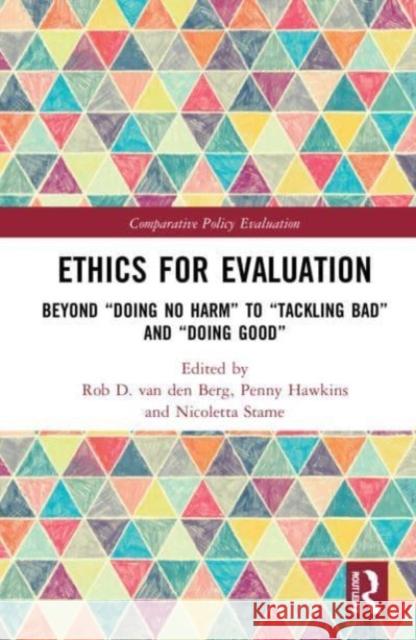Ethics for Evaluation » książka



Ethics for Evaluation
ISBN-13: 9781032161433 / Miękka / 2023 / 294 str.
In Ethics for Evaluation diverse perspectives on ethical guidance in evaluation are untangled and ordered in a theoretical framework focusing on evaluations doing no harm, tackling bad and doing good.
Wydanie ilustrowane
"Ethics for Evaluation is engaging and inspiring, and provides a valuable framework and guidance to help evaluators practice ethically across the global landscape. It is a must read for anyone planning to commission, conduct, or use evaluations in rapidly changing environments such as education, health care, communities, and a variety of organizational settings in these post-normal times."
Stewart I. Donaldson, Distinguished University Professor, Claremont Graduate University
"I strongly recommend this book for those who care about the impact of evaluation. It considers ethics for evaluators, in their actions and practices, and also for evaluations, in terms of how its scope and processes are framed. It also considers ‘tackling bad’ and ‘do no harm’ and then also ‘ be restorative’ – going beyond net-zero to having a positive impact. The range of examples means that it will offer lessons from examples that feel very familiar and from situations that appear unfamiliar. It deserves to be read by everyone involved in managing the evaluation function within an organisation, or who sees themselves as an evaluation professional, and should become essential reading in graduate evaluation programs."
Patricia Rogers, CEO, BetterEvaluation
[This book] fills a much-needed gap in the exploration of ethical issues faced by the evaluators and the evaluation profession. Through real-life case studies that resonate, this book provides much-needed guidance on how we can practice more ethically not only to reduce harm but to have a positive impact.
Visual Insights
Foreword Part 1: Ethical Framework and Guidance 1. A Framework for Approaching Ethics in Evaluation 2. Ethical Guidance: Enabling evaluation’s role in tackling bad and doing good Part 2: Case Studies and Issues Emerging in the Practice of Evaluation 3. Ethics and Evaluation: Ethical issues relating to environmental and social impact evaluations 4. Evaluation and Ethics in Contexts of Fragility, Conflict and Violence 5. Ethics in Evaluation in Resettlement Related Interventions 6. Evidencing the Impact of Complex Interventions: The ethics of achieving transformational change 7. Resilient Evaluators: Characteristics, conditions and prospects Part 3: Ethics in a Changing World 8. Ethical Practice through a Transformative Lens and Methodological Implications in Evaluation 9. The Danger of the Single Story: Evaluation, Ethics and the Global South 10. Evaluation Ethics, Models and Values: The professional imperative 11. Evaluation Ethics in Desperate Times Part 4: The Way Forward 12. Evaluation Contributing to the Common Good and to Tackling Bad: Ethical processes in evaluation
Rob D. van den Berg is Visiting Professor at King’s College London, Honorary Associate at the Institute of Development Studies and a member of the Advisory Council of Wilton Park. His advisory work includes the Climate Investment Funds, IFAD and other international organizations. After a career at the Dutch Ministry of Foreign Affairs, where he was Director of the Evaluation Department, he worked as Evaluation Director of the Global Environment Facility at the World Bank. He was President of IDEAS from 2014 to 2020. Rob has published articles and co-edited books on evaluation issues in the light of sustainable development and the need for transformational change.
Penny Hawkins is an independent consultant who works with philanthropic, government and private sector organizations to develop strategic and practical impact measurement systems. Prior to this, she held various evaluation leadership positions, including Head of Evaluation at the UK Department for International Development (DFID), the Rockefeller Foundation and the New Zealand Ministry of Foreign Affairs and Trade. Penny is a former Chair of the OECD-DAC Network on Development Evaluation, past President of the Australian Evaluation Society and is a faculty member for the Oxford Impact Measurement Course, Said Business School, University of Oxford.
Nicoletta Stame retired as Professor of Social Policy from Sapienza University of Roma. She has a long experience in evaluation, having been the former President of the Italian Evaluation Association and of the European Evaluation Society. She is associate editor of Evaluation, the International Journal of Theory, Research and Practice, and the vice-president of A Colorni-Hirschman International Institute. Nicoletta has published a number of books and articles on the theories and methods of evaluation. In her teaching and writing she aims at promoting democratic evaluation, as a tool for the improvement of society and politics, and an opportunity for supporting responsible practitioners.
1997-2026 DolnySlask.com Agencja Internetowa
KrainaKsiazek.PL - Księgarnia Internetowa









